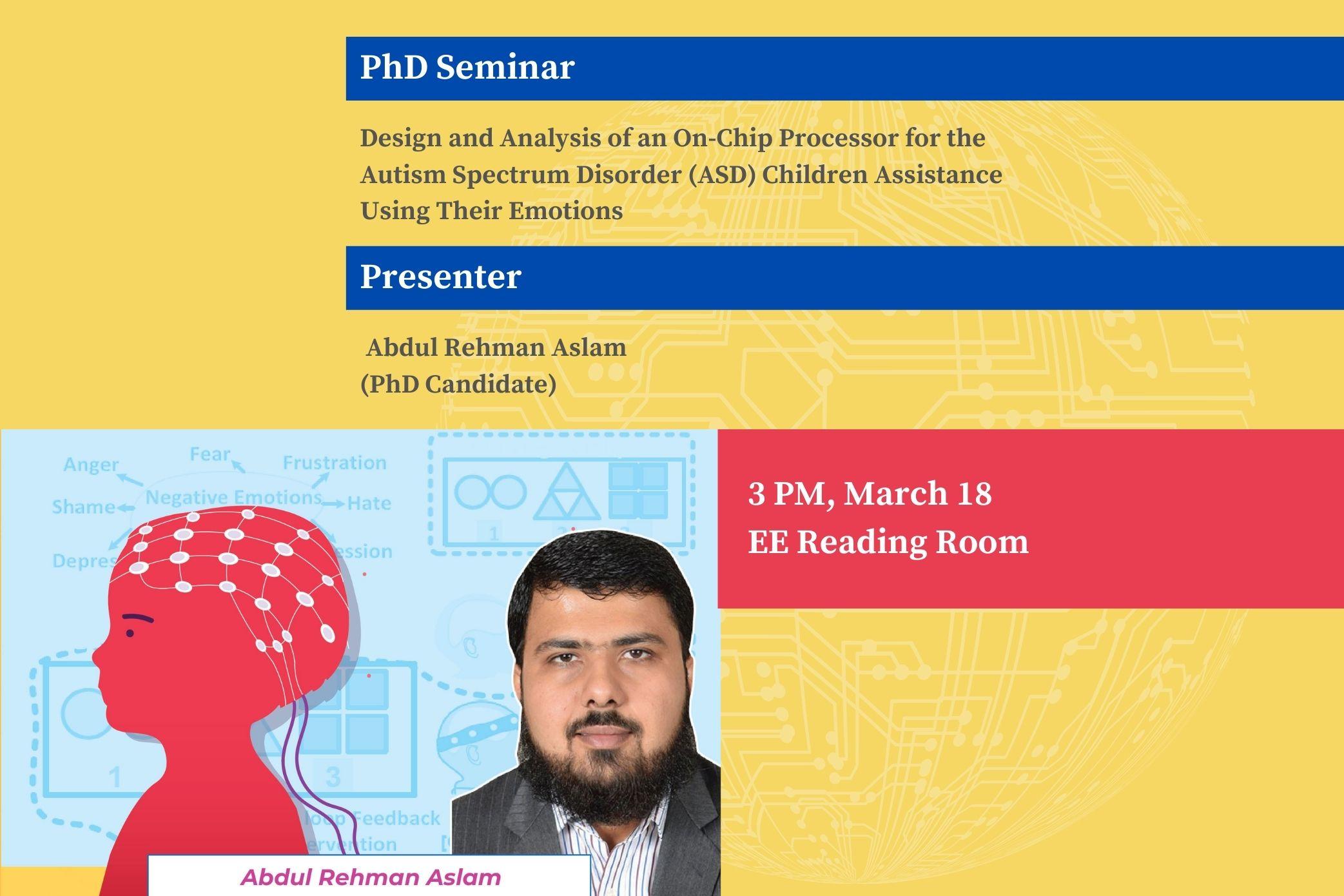
PhD Seminar | Design and Analysis of an On-Chip Processor for the Autism Spectrum Disorder (ASD) Children Assistance Using Their Emotions
I have addressed this need by Electroencephalography (EEG) based non-invasive, real-time, and continuous emotion prediction system on chip (SoC) based processor. The SoC processor utilizes the minimum (2) number of channels and provides maximum classification accuracy (>85%). The classification processor utilizes only two features per channel to minimize the area and power utilization. The proposed approximated skewness indicator feature was implemented using 86X lower area (gate count) after tuning the conventional mathematical formula for skewness. The 2-layer customized deep neural network classifier with 45 neurons was implemented in a semi pipelined manner after instructions rescheduling and customized ALU implementation with 34X lower area (gate count) compared to conventional implementation. The 16mm2 SoC (0.18µm 1P6M CMOS process) consumes 10.13μJ/classification for 2-channel operation.
Abdul Rehman Aslam is a PhD candidate in Electrical Engineering department. He has completed his MSc degree in Computer Engineering from the Lahore University of Management Sciences (LUMS), Lahore, Pakistan, in 2012 and BSc degree in Computer Engineering from the University of Engineering and Technology Taxila, Pakistan in 2008.
His research interests include embedded systems, digital design, on-chip implementation of machine learning/ deep learning algorithms, and low power bio-medical processors with special focus on neurological disorders. During his PhD, he has published multiple high impact journals, book chapters and presented in top international conferences and PhD forums. He is also the recipient of the Syed Babar Ali Research Award (SBARA), LUMS, Pakistan (2020–2022), Commonwealth split side Ph.D. scholarship for University of Glasgow, Scotland, U.K. (2021–2022), and IEEE Circuits and Systems Society Predoctoral research Award (2021–2022).
Committee Members: Dr. Muhammad Awais Bin Altaf (LUMS), Dr. Muhammad Adeel Ahmad Pasha (LUMS), Dr Nadeem Ahmad Khan (LUMS), Dr. Hadi Heidari (University of Glasgow, UK)
List of Publications:
Journals
1. A. R. Aslam, and M. A. B. Altaf, “A 8-Channel EEG based machine learning Emotion detection classification processor for Neurological Disorder”, IEEE Transactions on Biomedical Circuits and Systems (TBioCAS), vol. 14, no. 4, pp. 838-851, Aug. 2020.
2. A. R. Aslam, and M. A. B. Altaf, “A 10.13µJ/Classification 2-Channel Deep Neural Network Based SoC for Negative Emotion Outburst Detection of Autistic Children”, IEEE Transactions on Biomedical Circuits and Systems (TBioCAS), vol. 15, no. 5, pp. 1039-1052, Oct. 2021.
3. A. R. Aslam, N. Hafeez, H. Heidari and M. A. B. Altaf, “Channels and Feature Identification with Large Scale Feature Extraction for Emotions and ASD Classification”, Frontiers in Neuroscience (FRNS), 2022 [Under Review].
Book Chapter
1. A. R. Aslam, and M. A. B. Altaf, “Machine learning–based patient-specific processor for the early intervention in autistic children through emotion detection”, Neural Engineering Techniques for Autism Spectrum Disorder, Chapter 14, pp. 287-313, Jul. 2021.
Conferences
1. A. R. Aslam, N. Hafeez, H. Heidari and M. A. B. Altaf, "An 8.62 μ W Processor for Autism Spectrum Disorder Classification using Shallow Neural Network," in Proc. IEEE International Conference on Artificial Intelligence Circuits and Systems (AICAS), June. 2021 pp. 1-4.
2. A. R. Aslam, T. Iqbal, M. Aftab, W. Saadeh and M. A. Bin Altaf, "A10.13uJ/classification 2-channel Deep Neural Network-based SoC for Emotion Detection of Autistic Children," in Proc. IEEE Custom Integrated Circuits Conference (CICC), March. 2020, pp. 1-4.
3. A. R. Aslam, and M. A. B. Altaf, An 8 Channel Patient-Specific Neuromorphic Processor for the Early Screening of Autistic Children through Emotion Detection, in Proc. IEEE International Symposium on Circuits and Systems (ISCAS), May. 2019, pp. 1-4.
4. M. Sheeraz, A. R. Aslam and M. A. Bin Altaf, "Multiphysiological Shallow Neural Network-Based Mental Stress Detection System for Wearable Environment, “ in Proc. IEEE International Symposium on Circuits and Systems (ISCAS), May. 2022 [Accepted]
5. M. Sheeraz, A. R. Aslam, H. Heidari and M. A. Bin Altaf, "A Closed-Loop Ear Wearable EEG Measurement Device with Realtime Electrode Skin Impedance Measurement,“ IEEE International New Circuits and Systems Conference (NEWCAS), June. 2022 [Under Review]
6. M. Sheeraz, A. R. Aslam, N. Hafeez, H. Heidari and M. A. Bin Altaf, "A Wearable High Blood Pressure Classification Processor Using Photoplethysmogram Signals through Power Spectral Density Features, “IEEE International Conference on Artificial Intelligence Circuits and Systems (AICAS), June. 2022 [Under Review]
7. A. Hina, H. Nadeem, A. R. Aslam, and W. Saadeh, Live Demonstration: A Single LED PPG-Based Noninvasive Glucose Monitoring Prototype System, in Proc. IEEE International Symposium on Circuits and Systems (ISCAS), May 26-29, 2019.

